- Home
- James Joyce
A Portrait of the Artist as a Young Man Page 13
A Portrait of the Artist as a Young Man Read online
Page 13
Voices spoke near him:
— On hell.
— I suppose he rubbed it into you well.
— You bet he did. He put us all into a blue funk.
— That's what you fellows want: and plenty of it to make you work.
He leaned back weakly in his desk. He had not died. God had spared him still. He was still in the familiar world of the school. Mr Tate and Vincent Heron stood at the window, talking, jesting, gazing out at the bleak rain, moving their heads.
— I wish it would clear up. I had arranged to go for a spin on the bike with some fellows out by Malahide. But the roads must be knee-deep.
— It might clear up, sir.
The voices that he knew so well, the common words, the quiet of the classroom when the voices paused and the silence was filled by the sound of softly browsing cattle as the other boys munched their lunches tranquilly, lulled his aching soul.
There was still time. O Mary, refuge of sinners, intercede for him! O Virgin Undefiled, save him from the gulf of death!
The English lesson began with the hearing of the history. Royal persons, favourites, intriguers, bishops, passed like mute phantoms behind their veil of names. All had died: all had been judged. What did it profit a man to gain the whole world if he lost his soul? At last he had understood: and human life lay around him, a plain of peace whereon ant-like men laboured in brotherhood, their dead sleeping under quiet mounds. The elbow of his companion touched him and his heart was touched: and when he spoke to answer a question of his master he heard his own voice full of the quietude of humility and contrition.
His soul sank back deeper into depths of contrite peace, no longer able to suffer the pain of dread, and sending forth, as he sank, a faint prayer. Ah yes, he would still be spared; he would repent in his heart and be forgiven; and then those above, those in heaven, would see what he would do to make up for the past: a whole life, every hour of life. Only wait.
— All, God! All, all!
A messenger came to the door to say that confessions were being heard in the chapel. Four boys left the room; and he heard others passing down the corridor. A tremulous chill blew round his heart, no stronger than a little wind, and yet, listening and suffering silently, he seemed to have laid an ear against the muscle of his own heart, feeling it close and quail, listening to the flutter of its ventricles.
No escape. He had to confess, to speak out in words what he had done and thought, sin after sin. How? How?
— Father, I...
The thought slid like a cold shining rapier into his tender flesh: confession. But not there in the chapel of the college. He would confess all, every sin of deed and thought, sincerely; but not there among his school companions. Far away from there in some dark place he would murmur out his own shame; and he besought God humbly not to be offended with him if he did not dare to confess in the college chapel and in utter abjection of spirit he craved forgiveness mutely of the boyish hearts about him.
Time passed.
He sat again in the front bench of the chapel. The daylight without was already failing and, as it fell slowly through the dull red blinds, it seemed that the sun of the last day was going down and that all souls were being gathered for the judgement.
— I am cast away from the sight of Thine eyes: words taken, my dear little brothers in Christ, from the Book of Psalms, thirtieth chapter, twenty-third verse. In the name of the Father and of the Son and of the Holy Ghost. Amen.
The preacher began to speak in a quiet friendly tone. His face was kind and he joined gently the fingers of each hand, forming a frail cage by the union of their tips.
— This morning we endeavoured, in our reflection upon hell, to make what our holy founder calls in his book of spiritual exercises, the composition of place. We endeavoured, that is, to imagine with the senses of the mind, in our imagination, the material character of that awful place and of the physical torments which all who are in hell endure. This evening we shall consider for a few moments the nature of the spiritual torments of hell.
— Sin, remember, is a twofold enormity. It is a base consent to the promptings of our corrupt nature to the lower instincts, to that which is gross and beast-like; and it is also a turning away from the counsel of our higher nature, from all that is pure and holy, from the Holy God Himself. For this reason mortal sin is punished in hell by two different forms of punishment, physical and spiritual.
Now of all these spiritual pains by far the greatest is the pain of loss, so great, in fact, that in itself it is a torment greater than all the others. Saint Thomas, the greatest doctor of the church, the angelic doctor, as he is called, says that the worst damnation consists in this, that the understanding of man is totally deprived of divine light and his affection obstinately turned away from the goodness of God. God, remember, is a being infinitely good, and therefore the loss of such a being must be a loss infinitely painful. In this life we have not a very clear idea of what such a loss must be, but the damned in hell, for their greater torment, have a full understanding of that which they have lost, and understand that they have lost it through their own sins and have lost it for ever. At the very instant of death the bonds of the flesh are broken asunder and the soul at once flies towards God as towards the centre of her existence. Remember, my dear little boys, our souls long to be with God. We come from God, we live by God, we belong to God: we are His, inalienably His. God loves with a divine love every human soul, and every human soul lives in that love. How could it be otherwise? Every breath that we draw, every thought of our brain, every instant of life proceeds from God's inexhaustible goodness. And if it be pain for a mother to be parted from her child, for a man to be exiled from hearth and home, for friend to be sundered from friend, O think what pain, what anguish it must be for the poor soul to be spurned from the presence of the supremely good and loving Creator Who has called that soul into existence from nothingness and sustained it in life and loved it with an immeasurable love. This, then, to be separated for ever from its greatest good, from God, and to feel the anguish of that separation, knowing full well that it is unchangeable: this is the greatest torment which the created soul is capable of bearing, poena damni, the pain of loss.
The second pain which will afflict the souls of the damned in hell is the pain of conscience. Just as in dead bodies worms are engendered by putrefaction, so in the souls of the lost there arises a perpetual remorse from the putrefaction of sin, the sting of conscience, the worm, as Pope Innocent the Third calls it, of the triple sting. The first sting inflicted by this cruel worm will be the memory of past pleasures. O what a dreadful memory will that be! In the lake of all-devouring flame the proud king will remember the pomps of his court, the wise but wicked man his libraries and instruments of research, the lover of artistic pleasures his marbles and pictures and other art treasures, he who delighted in the pleasures of the table his gorgeous feasts, his dishes prepared with such delicacy, his choice wines; the miser will remember his hoard of gold, the robber his ill-gotten wealth, the angry and revengeful and merciless murderers their deeds of blood and violence in which they revelled, the impure and adulterous the unspeakable and filthy pleasures in which they delighted. They will remember all this and loathe themselves and their sins. For how miserable will all those pleasures seem to the soul condemned to suffer in hellfire for ages and ages. How they will rage and fume to think that they have lost the bliss of heaven for the dross of earth, for a few pieces of metal, for vain honours, for bodily comforts, for a tingling of the nerves. They will repent indeed: and this is the second sting of the worm of conscience, a late and fruitless sorrow for sins committed. Divine justice insists that the understanding of those miserable wretches be fixed continually on the sins of which they were guilty, and moreover, as saint Augustine points out, God will impart to them His own knowledge of sin, so that sin will appear to them in all its hideous malice as it appears to the eyes of God Himself. They will behold their sins in all their foulness and repent but
it will be too late and then they will bewail the good occasions which they neglected. This is the last and deepest and most cruel sting of the worm of conscience. The conscience will say: You had time and opportunity to repent and would not. You were brought up religiously by your parents. You had the sacraments and grace and indulgences of the church to aid you. You had the minister of God to preach to you, to call you back when you had strayed, to forgive you your sins, no matter how many, how abominable, if only you had confessed and repented. No. You would not. You flouted the ministers of holy religion, you turned your back on the confessional, you wallowed deeper and deeper in the mire of sin. God appealed to you, threatened you, entreated you to return to Him. O, what shame, what misery! The Ruler of the universe entreated you, a creature of clay, to love Him Who made you and to keep His law. No. You would not. And now, though you were to flood all hell with your tears if you could still weep, all that sea of repentance would not gain for you what a single tear of true repentance shed during your mortal life would have gained for you. You implore now a moment of earthly life wherein to repent: In vain. That time is gone: gone for ever.
— Such is the threefold sting of conscience, the viper which gnaws the very heart's core of the wretches in hell, so that filled with hellish fury they curse themselves for their folly and curse the evil companions who have brought them to such ruin and curse the devils who tempted them in life and now mock them in eternity and even revile and curse the Supreme Being Whose goodness and patience they scorned and slighted but Whose justice and power they cannot evade.
— The next spiritual pain to which the damned are subjected is the pain of extension. Man, in this earthly life, though he be capable of many evils, is not capable of them all at once, inasmuch as one evil corrects and counteracts another just as one poison frequently corrects another. In hell, on the contrary, one torment, instead of counteracting another, lends it still greater force: and, moreover, as the internal faculties are more perfect than the external senses, so are they more capable of suffering. Just as every sense is afflicted with a fitting torment, so is every spiritual faculty; the fancy with horrible images, the sensitive faculty with alternate longing and rage, the mind and understanding with an interior darkness more terrible even than the exterior darkness which reigns in that dreadful prison. The malice, impotent though it be, which possesses these demon souls is an evil of boundless extension, of limitless duration, a frightful state of wickedness which we can scarcely realize unless we bear in mind the enormity of sin and the hatred God bears to it.
— Opposed to this pain of extension and yet coexistent with it we have the pain of intensity. Hell is the centre of evils and, as you know, things are more intense at their centres than at their remotest points. There are no contraries or admixtures of any kind to temper or soften in the least the pains of hell. Nay, things which are good in themselves become evil in hell. Company, elsewhere a source of comfort to the afflicted, will be there a continual torment: knowledge, so much longed for as the chief good of the intellect, will there be hated worse than ignorance: light, so much coveted by all creatures from the lord of creation down to the humblest plant in the forest, will be loathed intensely. In this life our sorrows are either not very long or not very great because nature either overcomes them by habits or puts an end to them by sinking under their weight. But in hell the torments cannot be overcome by habit, for while they are of terrible intensity they are at the same time of continual variety, each pain, so to speak, taking fire from another and re-endowing that which has enkindled it with a still fiercer flame. Nor can nature escape from these intense and various tortures by succumbing to them for the soul is sustained and maintained in evil so that its suffering may be the greater. Boundless extension of torment, incredible intensity of suffering, unceasing variety of torture — this is what the divine majesty, so outraged by sinners, demands; this is what the holiness of heaven, slighted and set aside for the lustful and low pleasures of the corrupt flesh, requires; this is what the blood of the innocent Lamb of God, shed for the redemption of sinners, trampled upon by the vilest of the vile, insists upon.
— Last and crowning torture of all the tortures of that awful place is the eternity of hell. Eternity! O, dread and dire word. Eternity! What mind of man can understand it? And remember, it is an eternity of pain. Even though the pains of hell were not so terrible as they are, yet they would become infinite, as they are destined to last for ever. But while they are everlasting they are at the same time, as you know, intolerably intense, unbearably extensive. To bear even the sting of an insect for all eternity would be a dreadful torment. What must it be, then, to bear the manifold tortures of hell for ever? For ever! For all eternity! Not for a year or for an age but for ever. Try to imagine the awful meaning of this. You have often seen the sand on the seashore. How fine are its tiny grains! And how many of those tiny little grains go to make up the small handful which a child grasps in its play. Now imagine a mountain of that sand, a million miles high, reaching from the earth to the farthest heavens, and a million miles broad, extending to remotest space, and a million miles in thickness; and imagine such an enormous mass of countless particles of sand multiplied as often as there are leaves in the forest, drops of water in the mighty ocean, feathers on birds, scales on fish, hairs on animals, atoms in the vast expanse of the air: and imagine that at the end of every million years a little bird came to that mountain and carried away in its beak a tiny grain of that sand. How many millions upon millions of centuries would pass before that bird had carried away even a square foot of that mountain, how many eons upon eons of ages before it had carried away all? Yet at the end of that immense stretch of time not even one instant of eternity could be said to have ended. At the end of all those billions and trillions of years eternity would have scarcely begun. And if that mountain rose again after it had been all carried away, and if the bird came again and carried it all away again grain by grain, and if it so rose and sank as many times as there are stars in the sky, atoms in the air, drops of water in the sea, leaves on the trees, feathers upon birds, scales upon fish, hairs upon animals, at the end of all those innumerable risings and sinkings of that immeasurably vast mountain not one single instant of eternity could be said to have ended; even then, at the end of such a period, after that eon of time the mere thought of which makes our very brain reel dizzily, eternity would scarcely have begun.
— A holy saint (one of our own fathers I believe it was) was once vouchsafed a vision of hell. It seemed to him that he stood in the midst of a great hall, dark and silent save for the ticking of a great clock. The ticking went on unceasingly; and it seemed to this saint that the sound of the ticking was the ceaseless repetition of the words — ever, never; ever, never. Ever to be in hell, never to be in heaven; ever to be shut off from the presence of God, never to enjoy the beatific vision; ever to be eaten with flames, gnawed by vermin, goaded with burning spikes, never to be free from those pains; ever to have the conscience upbraid one, the memory enrage, the mind filled with darkness and despair, never to escape; ever to curse and revile the foul demons who gloat fiendishly over the misery of their dupes, never to behold the shining raiment of the blessed spirits; ever to cry out of the abyss of fire to God for an instant, a single instant, of respite from such awful agony, never to receive, even for an instant, God's pardon; ever to suffer, never to enjoy; ever to be damned, never to be saved; ever, never; ever, never. O, what a dreadful punishment! An eternity of endless agony, of endless bodily and spiritual torment, without one ray of hope, without one moment of cessation, of agony limitless in intensity, of torment infinitely varied, of torture that sustains eternally that which it eternally devours, of anguish that everlastingly preys upon the spirit while it racks the flesh, an eternity, every instant of which is itself an eternity of woe. Such is the terrible punishment decreed for those who die in mortal sin by an almighty and a just God.
— Yes, a just God! Men, reasoning always as men, are astonished th
at God should mete out an everlasting and infinite punishment in the fires of hell for a single grievous sin. They reason thus because, blinded by the gross illusion of the flesh and the darkness of human understanding, they are unable to comprehend the hideous malice of mortal sin. They reason thus because they are unable to comprehend that even venial sin is of such a foul and hideous nature that even if the omnipotent Creator could end all the evil and misery in the world, the wars, the diseases, the robberies, the crimes, the deaths, the murders, on condition that he allowed a single venial sin to pass unpunished, a single venial sin, a lie, an angry look, a moment of wilful sloth, He, the great omnipotent God could not do so because sin, be it in thought or deed, is a transgression of His law and God would not be God if He did not punish the transgressor.
— A sin, an instant of rebellious pride of the intellect, made Lucifer and a third part of the cohort of angels fall from their glory. A sin, an instant of folly and weakness, drove Adam and Eve out of Eden and brought death and suffering into the world. To retrieve the consequences of that sin the Only Begotten Son of God came down to earth, lived and suffered and died a most painful death, hanging for three hours on the cross.
— O, my dear little brethren in Christ Jesus, will we then offend that good Redeemer and provoke His anger? Will we trample again upon that torn and mangled corpse? Will we spit upon that face so full of sorrow and love? Will we too, like the cruel jews and the brutal soldiers, mock that gentle and compassionate Saviour Who trod alone for our sake the awful wine-press of sorrow? Every word of sin is a wound in His tender side. Every sinful act is a thorn piercing His head. Every impure thought, deliberately yielded to, is a keen lance transfixing that sacred and loving heart. No, no. It is impossible for any human being to do that which offends so deeply the divine majesty, that which is punished by an eternity of agony, that which crucifies again the Son of God and makes a mockery of Him.

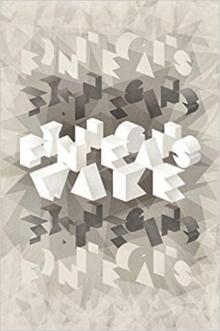 Penguin Classics the Restored Finnegans Wake
Penguin Classics the Restored Finnegans Wake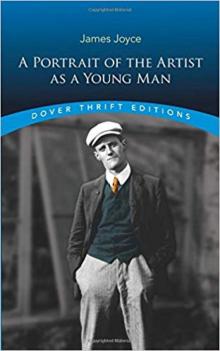 A Portrait of the Artist as a Young Man (Dover Thrift Editions)
A Portrait of the Artist as a Young Man (Dover Thrift Editions)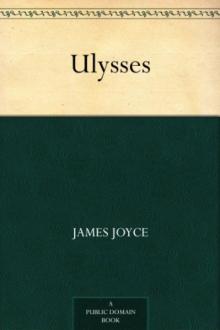 Ulysses
Ulysses Stephen Hero
Stephen Hero Dubliners
Dubliners A Very Irish Christmas
A Very Irish Christmas The Complete Works of JAMES JOYCE
The Complete Works of JAMES JOYCE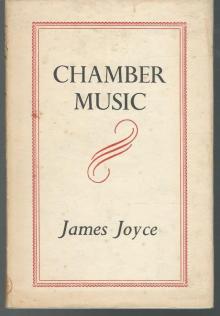 Chamber Music
Chamber Music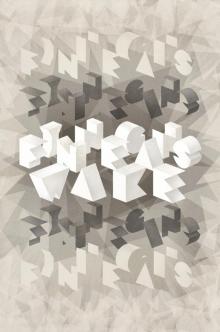 The Restored Finnegans Wake
The Restored Finnegans Wake A Portrait of the Artist as a Young Man
A Portrait of the Artist as a Young Man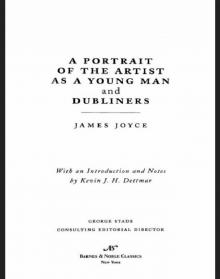 Portrait of the Artist as a Young Man and Dubliners (Barnes & Noble Classics Series)
Portrait of the Artist as a Young Man and Dubliners (Barnes & Noble Classics Series)